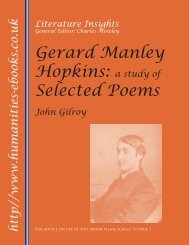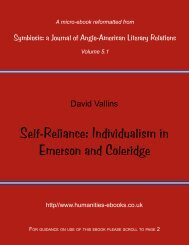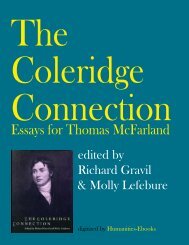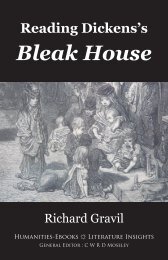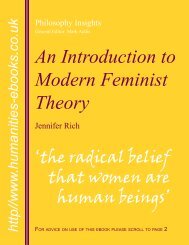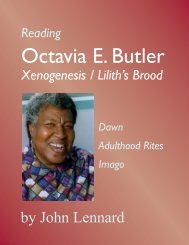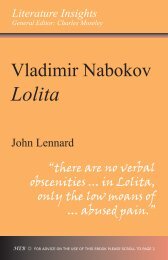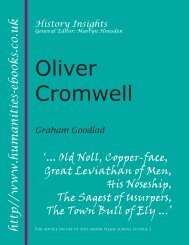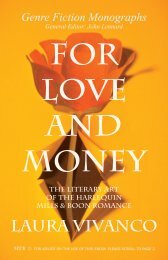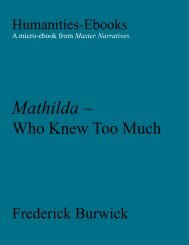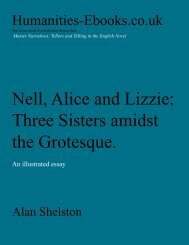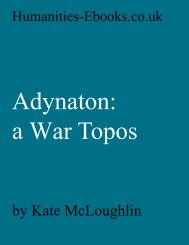You also want an ePaper? Increase the reach of your titles
YUMPU automatically turns print PDFs into web optimized ePapers that Google loves.
Running Head 1<br />
http//www.humanities-ebooks.co.uk<br />
Literature Insights<br />
<strong>General</strong> <strong>Editor</strong>: Charles Moseley<br />
Henrik Ibsen<br />
A Doll’s House<br />
S. H. Siddall<br />
‘‘Ibsen seemed<br />
to belong …<br />
to another<br />
world”
Publication Data<br />
© S. H. Siddall, 2008<br />
The Author has asserted his right to be identified as the author of this Work<br />
in accordance with the Copyright, Designs and Patents Act 1988.<br />
Published by <strong>Humanities</strong>-<strong>Ebooks</strong> LLP<br />
Tirril Hall, Tirril, Penrith CA10 2JE<br />
Reading Options<br />
* To use the navigation tools, the search facility, and other features of the<br />
toolbar, this Ebook should be read in default view.<br />
* To navigate through the contents use the hyperlinked ‘Bookmarks’ at<br />
the left of the screen.<br />
* To search, expand the search column at the right of the screen or click<br />
on the binocular symbol in the toolbar.<br />
* For ease of reading, use to enlarge the page to full screen<br />
* Use to return to the full menu.<br />
* Hyperlinks appear in Blue Underlined Text. To return from an internal<br />
hyperlink use the ‘previous view’ button (more than once if need be).<br />
* For a computer generated reading use Read out loud><br />
Licence and permissions<br />
Purchasing this book licenses you to read this work on-screen and to print<br />
one copy for your own use. Copy and paste functions are disabled. No part<br />
of this publication may be otherwise reproduced or transmitted or distributed<br />
without the prior written permission of both the copyright owner and the publisher.<br />
Making or distributing copies of this book constitutes copyright infringement<br />
and would be liable to prosecution. Thank you for respecting the rights<br />
of the author.<br />
ISBN 978-1-84760-059-2
Henrik Ibsen:<br />
A Doll’s House<br />
S. H. Siddall<br />
Tirril: <strong>Humanities</strong>-<strong>Ebooks</strong>, 2008
Contents<br />
The Author<br />
1. Ibsen’s Life as a Playwright<br />
2. Reading A Doll’s House: Act 1<br />
2.1 Christmas Spending<br />
2.2 Excavating the Past: Nora and Kristine<br />
2.3 Dr. Rank ‘at home’<br />
2.4 Work and Play<br />
2.5 Krogstad’s Blackmail<br />
2.6 Torvald’s Christmas Sermon<br />
3. Reading A Doll’s House: Act 2<br />
3.1 Motherhood<br />
3.2 What is Dr. Rank’s role?<br />
3.3 Seducing Torvald<br />
3.4 Dr. Rank Misjudges<br />
3.5 Further Pressure from Krogstad<br />
3.6 Miracles<br />
3.7 The Tarantella<br />
4. Reading A Doll’s House: Act 3<br />
4.1 Kristine and Krogstad<br />
4.2 After the Party<br />
4.3 ‘Thank you for the light’<br />
4.4 The Damaging Letter<br />
4.5 ‘I am Saved’<br />
4.6 Nora’s Truth<br />
4.7 Alternative Endings
A Doll’s House <br />
5. Overview<br />
5. 1 Christmas<br />
5.2 Home and Beyond<br />
5.3 Structure<br />
8. A Feminist Playwright?<br />
9. Ibsen and Shaw<br />
10. Ibsen and Archer<br />
11. Theatre as Ibsen Found it<br />
12. A Doll’s House: Afterlife on Stage<br />
Conclusion<br />
Further Reading
The Author<br />
Stephen Siddall was Head of English at The Leys School in Cambridge for 31 years<br />
and has taught Shakespeare courses for university students and for the University of<br />
Cambridge International Summer School in Shakespeare. Between 1988 and 2005<br />
he directed 15 Renaissance classic plays for The Arts Theatre, Cambridge and, more<br />
recently A Doll’s House and Waiting for Godot for the Horseshoe Theatre Company.<br />
He has also directed for BBC television and for the (open air) Pendley Shakespeare<br />
Festival. For Cambridge University Press he has written a student guide for Macbeth<br />
(2002), Shakespeare on Stage (2008) and Landscape and Literature (to be published<br />
in 2009)
1. Ibsen’s Life as a Playwright<br />
1891 saw the publication of The Quintessence of Ibsenism. It was written by George<br />
Bernard Shaw, the most famous and controversial playwright in England. After Ibsen’s<br />
death in 1906 Shaw revised the book several times, he wrote an obituary, several<br />
reviews and many articles about Ibsen’s value and reputation as a great Norwegian<br />
who had become an even greater European. In 1911, Shaw declared that Ibsen ‘seemed<br />
to belong not merely to another country and another order but to another world’.<br />
Ibsen would have enjoyed at least two aspects of Shaw’s praise: he was unique and<br />
he didn’t belong.<br />
Future fame could hardly have been expected in his early life. He was born in<br />
Skien, a small Norwegian town, in 1828 into a family that was comfortable in his<br />
early years. Then his father lost money and they suffered hard times. At the age of<br />
18 Ibsen became apprentice to an apothecary and fathered an illegitimate son, whose<br />
existence he tried to conceal and who played no part in his life afterwards. In his adolescent<br />
years he even held serious doubts about his own legitimacy. He was a bookish<br />
outsider when young, sometimes mocked and always introverted and solitary as he<br />
struggled with the shame of his father’s fall from prosperity.<br />
In 1850 he moved to Christiania (now Oslo) to study medicine, but failed to enter<br />
the university. But by this time he had begun to write: social commentary and satire<br />
for a magazine, but also his first play, Catiline (or sometimes Catalina), a large-scale<br />
historical tragedy in verse. His progress was rapid and in the following year, 1851, he<br />
was appointed playwright-in-residence at the main theatre in Bergen. Five years later<br />
he moved to a similar post at Christiania. This ten year period became for him a time<br />
of intense learning about theatre traditions, stagecraft and play-writing, with a focus<br />
on Scandinavian subjects, especially Norwegian art and culture. In 1858 he married<br />
Suzannah Thorensen and their son Sigurd was born the following year. Suzannah recognised<br />
Ibsen’s talent and dedication (perhaps more than he recognised her support)<br />
and she dedicated her life to serving him.<br />
In 1862 the theatre was suffering financial problems, which led to conflict with the<br />
theatre board. Ibsen left and in 1864 he was given a grant to travel to Italy. He chose<br />
a long exile of 27 years away from Norway, with only very occasional visits home.
A Doll’s House <br />
He found that travelling away from his roots stimulated in him a creativity that both<br />
evoked his homeland and also encouraged a critique of it. As his fame developed,<br />
especially in Germany, so he cultivated its opposite: the solitary man’s grumpy and<br />
truculent dislike of celebrity.<br />
Ibsen was never a comfortable man or playwright. When Max Beerbohm wrote<br />
his obituary in the Saturday Review (26th May 1906), he commented on Ibsen’s propensity<br />
for making enemies:<br />
He was indeed a perfect type of the artist. There is something impressive,<br />
something magnificent and noble, in the spectacle of his absorption in himself—the<br />
impregnability of that rock on which his art was founded. But, as<br />
we know, other men, not less great than Ibsen, have managed to be human<br />
… Innate in us is the desire to love those whom we venerate. To this desire,<br />
Ibsen, the very venerable, does not pander.<br />
In Norway there was no doubt about Ibsen’s status. In 1873 Oskar II at his coronation<br />
at Trondheim as king of the Swedish/Norwegian union did him a very rare<br />
honour: he was made a Knight of the Order of St. Olaf for his ‘services to literature’.<br />
In 1874 students in Christiania held a torchlight procession in his honour at the opening<br />
of the new theatre season. At this stage in his career he was a poet and a dramatist<br />
of large-scale historical plays, to which he added the evocative pair in verse that took<br />
his reputation to a new level: Brand in 1866, the bleak story of an uncompromising<br />
priest, and Peer Gynt in 1867, a comic picaresque account of another search for<br />
fulfilment. This play includes the memorably symbolic moment where Peer strips<br />
away the layers of an onion to discover its core, but finds instead that the layers<br />
eventually peter out into nothing. Ibsen identifies neither with the austere Brand nor<br />
the self-indulgent Peer, but the notion of a search or spiritual journey was central to<br />
both his life and his art: ‘In every new poem or play I have aimed at my own spiritual<br />
emancipation and purification.’ These early plays assured his reputation; his equally<br />
memorable social realist plays were still to come.<br />
In 1877 Ibsen had to face the news of his father’s death. He had not been home,<br />
nor had he met his father for many years, while the rest of the family dealt with obligations<br />
which he might have been expected to share. A letter written to his uncle<br />
comes near to acknowledging a sense of guilt: ‘Obviously in the eyes of outsiders it<br />
looks as though I have deliberately cut myself off from my family once and for all,<br />
and wilfully made myself a stranger.’ What follows is Ibsen’s attempt to set this feeling<br />
against his strong belief that an artistic vocation takes priority over normal duties<br />
and morality:
A Doll’s House <br />
During my last visit to Norway I had a strong desire to visit Skien and my<br />
relatives in particular; but I felt a strong antipathy to the thought of any closer<br />
contact with certain dominant spiritual tendencies there, for which I have<br />
no sympathy at all, and over which a disagreement could easily have called<br />
forth unpleasantness or at least created an uncomfortable atmosphere which<br />
I would rather avoid … I doubt whether in the long run I could be happy or<br />
work in Norway. My living conditions here, in the atmosphere of the outside<br />
world, where there is freedom of thought, and people take a broad view of<br />
things, are much to be preferred. On the other hand, living like this demands<br />
many sacrifices of many different sorts. <br />
This last sentence may feel like a devious way of evading the question of ‘sacrifice’.<br />
Perhaps he would have sacrificed more by remaining close to his family? How<br />
much of a sacrifice is it to follow one’s own artistic conviction? There are no simple<br />
answers (probably not for him either), and it is certainly true that his father’s death<br />
brought to the surface moral issues that he might have preferred to keep hidden. Issues<br />
connected with concealment and exposure would dominate his future writing.<br />
Ibsen was always alert to the social and political world around him, and it must<br />
have been clear that the era of romantic nationalism was coming to an end. Capitalist<br />
expansion was changing Europe; in 1872 Norway began a great development in railway<br />
building, which generally accompanies a new professionalism in any community.<br />
In the 1870s Ibsen was travelling throughout Europe, especially in Italy and<br />
Germany. Pillars of Society in 1877 started him on a new approach, writing plays<br />
which evoke and dissect middle-class life through close observation. Brand and Peer<br />
Gynt had been timeless plays set in the world of imagination: what followed were<br />
stories of private relationships in naturalistic settings. A Doll’s House appeared in<br />
1879, then in the 1880s he wrote Ghosts, An Enemy of the People, The Wild Duck,<br />
Rosmersholm and The Lady from the Sea. He wrote these plays in prose rather than<br />
verse, but firmly believed that he was still a poet in the theatre. His view of poetry<br />
(and that of his more perceptive commentators) was that the play’s meaning extends<br />
beyond its ostensible theme and its naturalistically observed situation. His writing<br />
is ‘poetic’ in its intuitively felt subtext that includes echoes of language and motif<br />
that extend the play’s imaginative range towards a deeper truth that has metaphysical<br />
connotations beyond its particular situation. For him ‘poetic’ was not a synonym<br />
for decorative or lyrical. In 1891 when Ghosts was widely attacked for its apparent<br />
<br />
Quoted by Robert Ferguson, Henrik Ibsen: A New Biography, (London: Richard Cohen Books,<br />
1996) pp. 224–226
A Doll’s House 10<br />
narrow ugliness, Ibsen’s irritable reply was that ‘the definition of poetry will have to<br />
be changed in Norway to conform to my play’.<br />
A Doll’s House came to him as a memory of real-life events very close to home. In<br />
1872 a young woman, Laura Petersen, became a close friend of the Ibsen family after<br />
writing her first novel Brand’s Daughters. Ibsen used to call her his ‘skylark’ and she<br />
became almost the daughter they never had. In 1873 she married a Danish schoolmaster,<br />
Victor Kieler. When he became ill with tuberculosis his doctor prescribed<br />
restorative travel to Switzerland and Italy, for which Laura paid by secretly taking out<br />
a loan. On their return they called on the Ibsens in Munich, where Laura told her story<br />
to Suzannah and her problems with paying back the loan. To contribute towards the<br />
repayment, Laura aimed to make money as a writer and asked Ibsen to make a public<br />
recommendation of her new book. He refused, believing that she was squandering<br />
her artistic talents on writing that was rushed and irresponsibly slapdash. Instead he<br />
urged her to confide in her husband: ‘In a family in which the husband is alive it can<br />
never be necessary for the wife to—as you are doing—drain her own spiritual blood’.<br />
Ibsen, always the paternalist, believed that Victor would act with the chivalry that, in<br />
the play, Nora expected from Torvald. He would cope with the problem and ‘he must<br />
inevitably feel it his duty and his responsibility to shepherd your talent’.<br />
Laura forged a cheque to repay the loan, then—with the problem exacerbated—<br />
she confessed her folly and crime. Her husband was outraged, insisted on a separation,<br />
and condemned her as an unfit mother. She had a nervous breakdown and her<br />
implacable husband had her committed for four weeks to an asylum for the insane.<br />
The painful story ended two years later when Laura returned to her husband. This<br />
situation provided Ibsen with the core of his story, though in writing his play, he softened<br />
and complicated the marriage relationship and completely altered the story’s<br />
conclusion.<br />
When Ibsen recalled this story he was living in Amalfi in the Hotel Luna, a converted<br />
Franciscan monastery with a view over the Gulf of Salerno. He was writing<br />
with the freedom of sun and space around him, an atmosphere utterly different from<br />
the enclosed space in the play: the Helmers’ house at Christmas. He worked so rapidly<br />
that he had completed his first draft between 25th May and 3rd August. Before<br />
writing his plays he always made detailed notes and absorbed himself totally in the<br />
characters and their situations. One day he told his wife that he had seen Nora in the<br />
street: ‘She was wearing a simple blue dress’.<br />
He was absorbed by Nora in his art; just so, ten years later in 1889, he became<br />
entranced by two young women in his real life. Helene Raff and Emilie Bardach
Is this sample what you are looking for?<br />
If so, please browse our lists<br />
or look for different formats at:<br />
http://www.humanities-ebooks.co.uk<br />
or buy this PDF book<br />
HERE<br />
About <strong>Humanities</strong> <strong>Ebooks</strong><br />
<strong>Humanities</strong>-<strong>Ebooks</strong> is an an authors’ co-operative, not a commercial publisher.<br />
Our aim is to produce inexpensive, high quality <strong>Ebooks</strong>, and to pass the maximum<br />
possible proportion of the purchase price to their authors.<br />
Almost all our titles are available in Kindle format, though for academic books<br />
and those with complex layout the PDF is almost invariably superior.<br />
All our titles can be ordered by libaries through Ebrary, EBSCO and MyiLibrary.<br />
Paperback versions of many of our titles can be reached via the book descriptions<br />
on our website.



